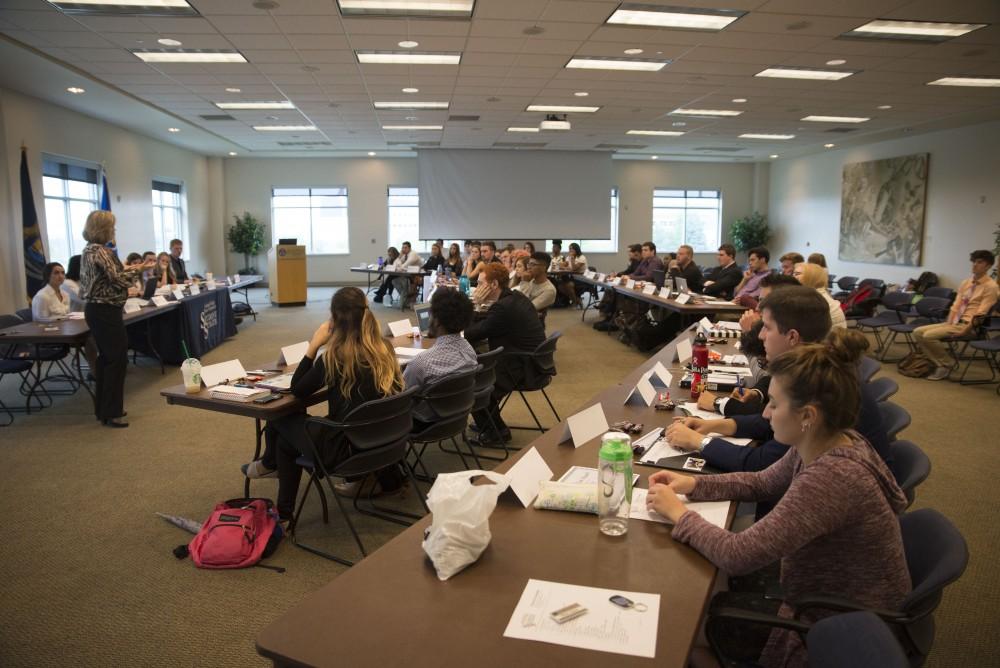Promoting religious diversity

GVL / Luke Holmes – Student Senate met in the Pere Marquette room on Thursday, Oct. 6, 2016.
Oct 20, 2016
Religion is a controversial topic that can cause some heated arguments at the dinner table. Grand Valley State University’s Kaufman Interfaith Institute strives to promote interfaith diversity and literacy between religions.
Katie Gordon, program manager at the Kaufman Institute, talked to GVSU’s student senate about the importance of the work she does and emphasized the institute’s continued work toward a religiously diverse campus community.
“We work with different congregations, also secular groups, (as) well as religious congregations from all different traditions and service organizations,” Gordon said. “The mission of campus interfaith resources is to support the understanding and engagement of the diverse religious, spiritual and secular identities of our students, campus and community in order to develop integrated lives and promote social justice.
Gordon said some people think the word “interfaith” implies the need to have a religion. She assured the student senators they don’t just cater to people with a religion, they strive to be inclusive to all ways of thinking.
“We always try to intentionally define that interfaith is open to all religious, spiritual and secular identities,” she said.
Over the past few years, Gordon said, she has seen a shift from college campuses across the nation when it comes to interfaith work.
“What we’ve seen when it comes to religious diversity and interfaith engagement is that more and more college campuses care about interfaith because it’s a way of intentionally embracing religious diversity on campus,” she said.
Gordon’s work has recently been to connect students with the community.
“We have a really diverse community in Grand Rapids,” she said. “We have five mosques, we have a Hindu temple, Sikh Gurdwara, some Buddhist temples, a lot of churches (and) we have three Jewish temples.
“We have a pretty thriving Center for Inquiry, which is a group for atheists, agnostics, humanists, free-thinkers, etc.”
Rachel Travis, vice president for the student senate finance committee, asked Gordon her thoughts about the Easter egg hunt activity that took place last year. The event was seen as non-inclusive by some GVSU students because Easter is a Christian holiday. Gordon said the people who were offended by the event talked to those who organized it and discussed why it didn’t feel inclusive and how to improve and prevent that feeling.
Gordon said her work is also connected to an increase of tension around religious identity. She said in particular the increase with micro-aggressions that students experience or bias incidents on campus.
“There’s definitely something we have to do as an intentional response to bias incidents,” she said. “But we also view the importance of education and awareness about diversity on campus as a part of that interfaith work on campus.”
Improving religious literacy is something Gordon emphasized on wanting to work on in the following years. Something the university has is a multi-faith calendar. This is so big campus-wide events don’t interfere with religious holidays. Gordon said this is so certain groups of students aren’t left out of these activities just because of their religious practices.
Another area the Kaufman Interfaith Institute is working on is the addition of inclusive rooms and spaces for all religions and practices on campus.
“An initiative that interfaith groups have taken on over the last few years is making sure that there is inclusive spaces for religiously unrepresented groups on campus and any religious (group) on campus,” she said.
With the help of student senate, faculty senate, various student organizations and many other administrators, the inclusive prayer/ meditation room was created in the Kirkhof Center.
For more about the Kaufman Interfaith Institute and what they are working on, go to www.gvsu.edu/interfaith.

























